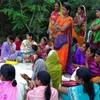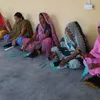Meet these 5 entrepreneurs from small towns in India who are empowering other women
Limited resources and conventional views can make starting up as a woman in small towns in India a tough task. But these five women entrepreneurs were determined to find success on their own accord.
India is brimming with talented women who can contribute a huge amount of wealth into the country’s economy, and empower others along the way. According to recent research by McKinsey Global Institute, India could add $770 billion - more than 18 percent - to its GDP by 2025, by giving equal work opportunities to women. However, with the prejudice against women, progress has been slow.
Although there needs to be a huge reform in the way the country works, and monumental changes in the mindsets of people, there are many women who have been able to stand their ground and establish themselves as entrepreneurs.
Here are five women entrepreneurs from small towns in India who are making a great impact today.

(L-R) Gunavathy Chandrasekaran, Godavari Satpute, Sobita Tamuli, Pabiben Rabari, Anita Gupta
Gunavathy Chandrasekaran
A resident of Sivakasi, Tamil Nadu, 41-year-old Gunavathy Chandrasekaran found her passion for quilling early in life, and worked on it with enthusiasm. Having survived a polio attack when she was just two-years-old, Gunavathy was considered less capable, and was married off at 16.
Determined to be financially independent and find success, Gunavathy taught herself how to make scraps of paper into beautiful pieces of art, and slowly picked up pace. Today, under the brand name Guna's Quilling, the woman entrepreneur sells quilled art work such as wall art, greeting cards, miniature figurines, jewellery, and much more.
She has also conducted workshops and trained over 2,000 artisans, of whom most are women, homemakers, students, and children in orphanages. She helps some of them with marketing their products as well.
In 2015, she was invited by the British Council to address a gathering about growing as a successful entrepreneur. She is also part of the Quilling Guild, a UK-based group for quilling experts.
Gunavathy has received accolades such as the Woman of Excellence Award by the Lions Club of Thirunagar and the District Award by the Government of Tamil Nadu.
Godavari Satpute
Thirty-eight-year-old Godavari Satpute, who hails from Nari Village, Maharashtra, runs her own paper lamp manufacturing business - Godavari Akashkandil - which she founded in 2009.
Before starting up, Godavari faced severe financial challenges because her husband lost his job after the company he worked for ran into losses. Godavari, although determined to help her husband, did not have enough education to find a job that would bring enough income for her children and joint family.
Godavari's eureka moment struck when she spotted a paper lamp in a local market, which she realised she could also make easily. With her husband's encouragement, Godavari sought loans from banks, but was turned away. Her relatives then offered her a small interest-free loan, and Godavari was able to lay the foundation. She eventually approached BYST (Bharatiya Yuva Shakti Trust) for financial aid and entrepreneurial guidance to take her company further.
Godavari employs many other women and enables them to become financially independent. In 2013, the company clocked a revenue of over Rs 30 lakh.
Godavari also bagged Woman Entrepreneur of the Year award at the Youth Business International Awards 2013.
Sobita Tamuli
Hailing from the Telana village in Assam, 35-year-old Sobita Tamuli runs Seuji, an all-women self-help group that manufactures and sells organic manure, and makes and sells traditional Assamese japis.
Sobita initially had the idea for Seuji back in 2002 as a teenager who had been married off. Later, she gathered a few other women in her village, and put her plan into action. Known as Kesuhaar, Seuji makes organic manure containing natural elements like cow dung, banana plant remains, earthworms, and fallen leaves, and sells it for Rs 50 per packet (weighing 5 kg each).
Seuji also makes and sells japis, which are traditional conical, wide-rimmed Assamese hats. The group makes the hats according to the requests of an individual or an organisation, and also sells them in neighbouring markets.
Sobita's priority is leaving middlemen out, and doing everything from ideating to manufacturing and selling from scratch.
Pabiben Rabari
Belonging to the Rabari community of Gujarat, Pabiben runs an enterprise that empowers women artisans - Pabiben.com. The all-women company makes bags, dhurries, files, quilts, cushion covers, and more. It employs a special craft form invented by Pabiben - Hari Jari - which is machine application of ready-made elements.
Pabiben, who lives in the Bhadroi village, started working as a young girl to help her widowed mother. She couldn't complete her formal education because of financial constraints, so she stayed at home learning traditional embroidery from her mother.
In 1998, Pabiben joined a Rabari women's group, and worked on her embroidery skills. She soon became the best artisan of the group. She made a variety of products, including the famous Pabi Bag, which combines vibrant ribbons and trims.
Through her business, she has created employment opportunities for over 60 women in her village, and is enabling them to become strong, skilled, and independent.
In 2016, Pabiben was awarded the IMC Ladies' Wing 24th Jankidevi Bajaj Puraskar for her exceptional contributions towards entrepreneurship in small towns.
Anita Gupta
Hailing from Arrah, Bihar, Anita Gupta founded the Bhojpur Mahila Kala Kendra in 1993, to empower women from small towns by providing them with education and employment training.
The NGO has trained more than 25,000 women in nearly 400 skills, and has formed around 300 women self-help groups in Bihar. The women manufacture and sell jewellery at government-organised fairs. It also supplies jewellery to various stores in Delhi, Pune, Mumbai and other cities.
Growing up, Anita lived in a severely patriarchal society. She saw her own grandfather 'buying' a girl to have children after his sons passed away. This incident left a deep mark on Anita, and she was determined to bring a change.
When Anita initially started out, the men in the houses she approached would not let her speak to the women, and ask her to leave. Getting through to the women posed the biggest challenge, but Anita persevered and has been able to empower thousands of them today.
In 2000, the NGO received support from Tata Institute of Social Sciences (TISS) and DC Handicrafts, Government of India. In 2008, Anita received an award from the Government of Bihar for her work towards empowering women. She is also a member of USHA Silai School in Bihar and Jharkhand, where she trains women in sewing.
(Edited by Rekha Balakrishnan)











